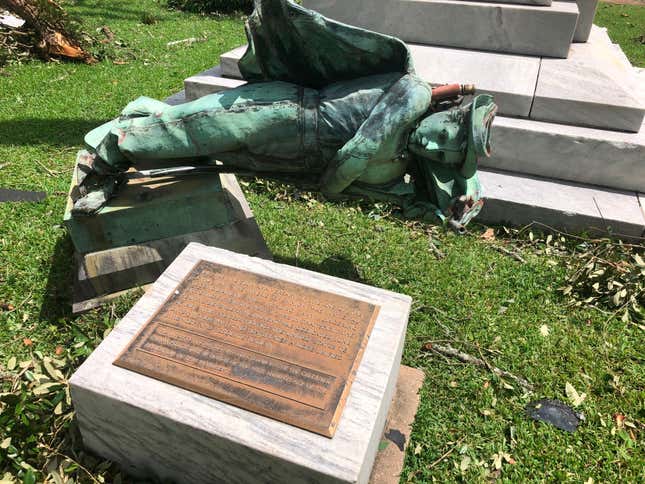
Since 1915, a garish statue honoring Confederate soldiers stood tall on the grounds of Lake Charles’ courthouse. This year, as Black Lives Matter movements inspired people around the world to topple statues honoring racist historical figures, the town appeared to seriously consider taking the statue down, but ultimately voted to keep the statue up.
The vote from the Calcasieu Parish Police Jury took place on Aug. 13., with the group deciding by a 10-4 margin to keep the South’s Defenders Monument up, in a town where 48 percent of the residents identify as Black.
But as the New Orleans Advocate reports, Hurricane Laura, which made landfall in Louisiana early Thursday morning as potentially the strongest storm to ever hit the state, toppled the statue her damn self.
Photos of the damage were shared all over social media on Thursday afternoon as residents began surveying the damage the historic storm made to their town.
The green statue was thrown off its pedestal, laying on its side on the courtyard grass, its legs crumpled beneath it. While many outside Lake Charles cheered the fallen statue, people from the area were more concerned about the state of their homes and their community.
Forecasters had warned of an “unsurvivable” storm surge across Southern Louisiana earlier in the week, urging people in affected areas to evacuate. Many took the warning seriously—the last time the National Hurricane Center issued such a warning was Hurricane Katrina, which hit the Gulf Coast 15 years ago this week.
While the storm surge did reach 20 feet in mostly rural, marshy areas, reports USA Today, many other places were spared the deadly levels predicted.
But there is still a long road to recovery for many Louisiana residents. At least six people have died as a result of Hurricane Laura, and aerial footage—as well as up-close photos of the damage—show a wide path of devastation carving through southwest Louisiana and southeast Texas. Roofs have been ripped off homes, businesses and schools, and many roads remain underwater. As of Thursday afternoon, more than 400,000 Louisiana residents were without power.

